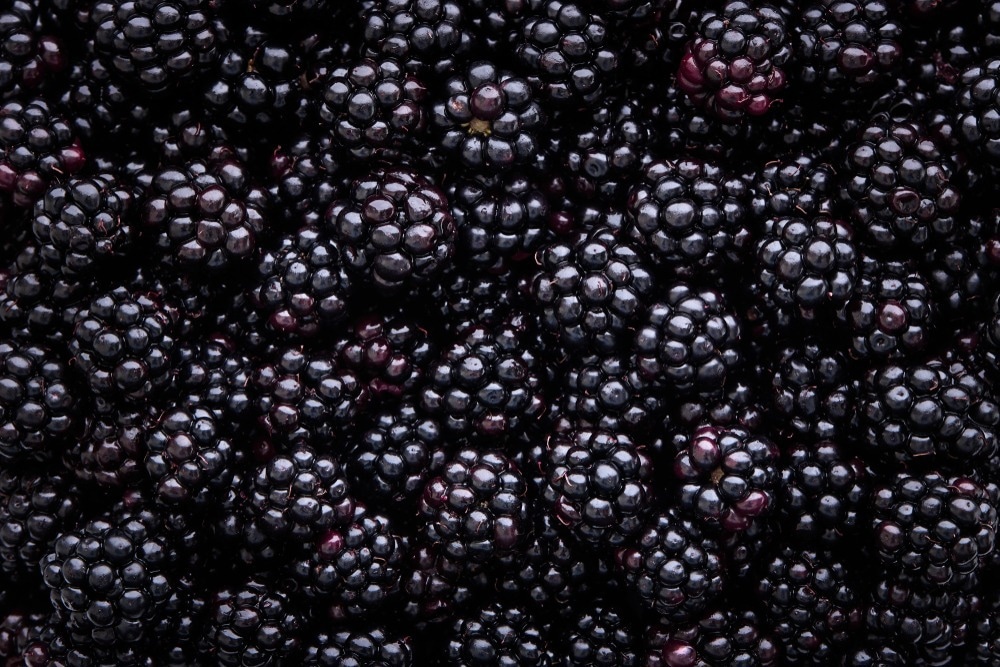The blackberry (Rubus fruticosus) is from the Rosaceae family and is among its most widely disseminated and highly popular members. It comprises multiple droplets, each up to 3 cm wide, changing from green to black as they ripen. Recently, they have come to be known as a superfood, which has further increased their demand.
This knowledge may help to understand how blackberries or their extracts can function as nutraceuticals – foods with medicinal properties – to promote health.

Study: Phytochemicals Determination, and Antioxidant, Antimicrobial, Anti-Inflammatory and Anticancer Activities of Blackberry Fruits. Image Credit: Melica/Shutterstock.com
Introduction
Blackberries contain large amounts of vitamins A and C, carotenoids, and other plant chemicals that provide few calories but have high bioactivity.
The phenols in blackberry fruits include anthocyanins, flavonols, ellagitannins, and phenolic acids, and they have been invested with the credit for most of the bioactivity of blackberry extract.
Plant phenols are both found in many types of plants and have high bioactivity. They have multiple types of chemical structures which allow them to perform many different functions and regulate or take part in a spectrum of cell processes by interacting with a range of molecules.
They are efficient scavengers of oxidizing molecules, including free radicals and metals.
Anthocyanins are the primary flavonoids in blackberries and the chief source of biological activity. Terpenoids also have a wide distribution and range of bioactivity.
What did the study show?
The blackberry fruit contained ~67 mg/g dry weight of bioactive compounds. The extract showed antioxidant activity equivalent to ~110 mg of quercetin or ~335 mg of vitamin C.
Multiple bioactives
Blackberries contain mainly phenolic compounds, including eight anthocyanins and nine phenolic acids or their derivatives.
They also found eleven flavonoids or their derivatives, more than half composed of various quercetin derivatives. Rutin and perhaps epicatechin were also detected.
In this study, researchers found 31 terpenoids, which are being described in blackberries for the first time. Most of them belonged to the ursane family.
These may account for the bioactivity of blackberry extract, along with the plant phenols.
Terpenes derived from ursolic acid make up almost 90% of the total bioactive fraction of the extract and 93% of the terpene content.
Terpenoids were present at almost 64 mg/g of fruit extract, making them the predominant component.
The most abundant of these was a strong pentacyclic triterpene antioxidant named hydroxytormentic acid, which regulates the expression of antioxidant-related genes and scavenges reactive oxygen species (ROS).
It protects neurons against oxidative damage, inhibits tumor cell activity, and is anti-inflammatory and antimicrobial.
Tormentic acid is also associated with metabolic regulation, reducing diabetic and dyslipidemic changes, besides demonstrating cardioprotective and antitumor activity.
Antioxidant capacity
The fruit was found to have a high antioxidant capacity by several assays, including the Folin-Ciocalteu, FRAP, DPPH, and TEAC.
An in vitro cellular assay using HUVEC cell lines also showed that when present at a concentration of only 5 mg/mL, blackberry extract produced significantly high antioxidant effects.
Antioxidant capacity may vary with the time of fruit harvesting, soil fertility, climate, and the method used to measure it.
Terpenes may synergize with phenolic compounds to produce this high antioxidant effect.
The extract reduced free radicals and inhibited lipid peroxidation more efficiently than quercetin at a dose of 5 mg/mL of extract (showing decreased but still protective activity at higher levels, perhaps due to a paradoxical prooxidant property at increased concentrations).
This activity has been demonstrated in rat models, where fluoride or carbon tetrachloride toxicity was inhibited by blackberry juice.
This needs to be established in human studies, as all exogenous antioxidants do not effectively reduce oxidative stress within the body.
Antimicrobial activity
The extract also showed antimicrobial activity, most potent against gram-positive bacteria such as Enterococcus faecalis, Bacillus cereus and gram-negative organisms like Escherichia coli. At 00 mg/mL, all tested microbes were killed.
Since this was not always proportional to the phenolic acid content, as shown by earlier studies, it is logical to deduce that terpenoids and other organic acids make major contributions as well.
Tumor cell inhibition
Antitumor activity was also demonstrated using colon cancer cells. Tumor activity was inhibited with a half-maximal inhibitory concentration (IC50) of <6 mg/mL, against three tumor cell lines.
Of course, the active compounds may undergo modification by the intestinal microbes, which may alter their tumor-inhibition capacity. This area will require further study.
Anti-inflammatory activity
Finally, blackberry extract showed anti-inflammatory activity. In its presence, two cell lines were shown to produce lower levels of the inflammatory cytokine interleukin IL-8, in a dose-response manner.
This is traceable to all classes of bioactive compounds acting in synergy.
This could make blackberries…
…an interesting source of bioactive compounds for the prevention and treatment of chronic inflammatory conditions or COVID-19 disease, among others.”
What are the implications?
These results support that blackberry fruits are an interesting source of bioactive compounds that may be useful in the prevention and treatment of different diseases, mainly related to oxidative stress.”